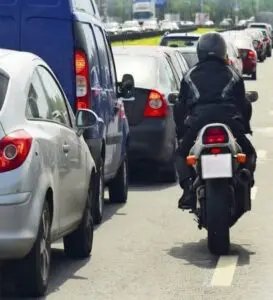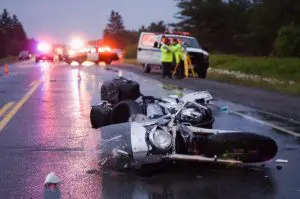Is Lane Splitting Legal in Pennsylvania?
Have you ever been driving through a congested area and noticed a motorcyclist weaving in and out of traffic? While many motorcyclists think lane splitting should be common practice, it is currently illegal under Pennsylvania law.
If you are involved in a motorcycle accident and have been lane splitting, or hit a motorcyclist due to lane splitting, it can impact your personal injury claim.
What Is Lane Splitting?
Lane splitting, also known as white lining, occurs when a motorcyclist drives between two rows or lanes of traffic. Most commonly, riders split lanes when traffic is moving slowly or at a standstill. Lane splitting can occur on any type of road, including highways or rural roads.
 Lane splitting is not the only traffic maneuver you may see a biker make. Other practices include:
Lane splitting is not the only traffic maneuver you may see a biker make. Other practices include:
- Lane filtering: The rider moves between stopped traffic or slow-moving traffic
- Lane sharing: Multiple motorcyclists share the same lane and ride beside each other in a close formation
- Shoulder surfing: When a rider drives on the shoulder of the road
A University of California, Berkley study found that motorcycle riders who engaged in lane splitting were less likely to be struck from behind in an accident but were more likely to rear-end the driver in front of them. Further, they were less likely to suffer from head or torso injuries in the event of a lane-splitting accident.
There are risks to lane splitting, though, so most states have enacted lane splitting laws prohibiting the act. Many drivers fear if lane splitting riders are not seen, another motorist could hit them, or the bike will be in the blind spot, causing an accident when traffic does begin to move.
Is Lane Splitting Legal in PA?
Lane splitting is currently illegal in Pennsylvania. California is the only state that has made it legal, although some states have adjusted their motorcycle laws regarding the practice.
New Mexico, Mississippi, North Carolina, Kentucky, Ohio, Indiana, and New Jersey have not declared lane splitting legal or illegal; instead, it is up to law enforcement’s discretion.
Currently, Washington, Oregon, Texas, Missouri, Virginia, Massachusetts, and Connecticut have placed lane splitting laws under consideration.
Montana, Utah, Colorado, and Arizona currently have legalized lane filtering but not lane splitting.
How Is Lane Splitting Different From Lane Sharing?
Because there are so many motorcycle maneuvers, it can be easy to confuse them. Many people believe that lane splitting and lane sharing are the same, but they are not.
Lane splitting occurs when motorcyclists ride between lanes of traffic. Lane sharing is when multiple motorcycle riders drive in the same lane of traffic but side by side.
While lane splitting is illegal in Pennsylvania, lane sharing is not. Though it is legal, riders engaging in lane sharing must remain mindful of other motorists on the busy streets.
Why Lane Splitting Is Dangerous
 Lane splitting, where motorcyclists ride between lanes of slow or stopped traffic, is a major cause of motorcycle accidents. Though traffic may be moving slower when a motorcycle rider lane splits, bikers are more likely to travel at higher speeds than the cars around them. Sudden traffic movement can throw riders off their bikes tossing them in front of or under a car depending on the movement of the surrounding lanes. Nearby drivers may react aggressively or have less time to respond. Lane splitting poses significant risks for serious or fatal accidents.
Lane splitting, where motorcyclists ride between lanes of slow or stopped traffic, is a major cause of motorcycle accidents. Though traffic may be moving slower when a motorcycle rider lane splits, bikers are more likely to travel at higher speeds than the cars around them. Sudden traffic movement can throw riders off their bikes tossing them in front of or under a car depending on the movement of the surrounding lanes. Nearby drivers may react aggressively or have less time to respond. Lane splitting poses significant risks for serious or fatal accidents.
While riders who engage in lane splitting are less likely to suffer torso or head injuries, it still leaves them at significant risk for serious or fatal injuries.
How Lane Splitting Can Affect Insurance Claims
Splitting lanes or engaging in versions of lane splitting like lane filtering can negatively impact your insurance claim if you get into an accident. While you have a right to pursue compensation so long as you are less than 51 percent at fault for the wreck, insurance adjusters may not be willing to accept your settlement offer.
But, if the other driver was also engaging in reckless driving, like distracted driving, speeding, or aggressive driving, you can still pursue compensation. You will need to establish liability and prove that:
- The motor vehicle driver had a duty of care to engage in road safety.
- The driver was negligent and behaved less safely than a reasonable person would have under similar circumstances.
- The driver’s negligence caused the accident.
- You were hurt as a result.
You must prove that you were less responsible for the accident, even with driving between lanes, than the other driver. A motorcycle accident lawyer from Munley Law can guide you through the claims process.
Comparative Fault in Pennsylvania Motorcycle Accidents
Pennsylvania is a comparative negligence state. This means that accident victims claiming personal injury can only make a case if they are less than 51 percent at fault for the wreck. Further, the percentage of fault they do hold will be used to adjust the compensation they recover.
For example, let’s say a motorcycle rider was doing some lane splitting when the accident occurred and was found to be 25 percent at fault. The motorcycle rider suffered severe injuries, and the insurance company estimates the accident to be valued at $100,000. Because of the percentage of fault they carried, the motorcycle rider could only collect $75,000 in compensation.
As lane-splitting is an illegal activity, you will share some portion of responsibility, but based on the specifics of your accident, an attorney may be able to help advise you on your next steps.
Because of this, motorcyclists must follow traffic laws, even in the most congested areas, to avoid accidents and injuries.
Steps to Take after a Lane Splitting Motorcycle Accident
 After a lane splitting motorcycle accident, you should take a few steps to preserve your safety and your legal claim.
After a lane splitting motorcycle accident, you should take a few steps to preserve your safety and your legal claim.
First, call the police and get medical treatment. Even if you do not think you are injured, get an exam anyway, as this will be needed for your insurance claim if injuries do emerge.
Check yourself and the other motorist and move to a safe location out of the lanes of moving traffic if possible. Then, gather evidence from the scene. Take pictures, get witness information, etc. You will also need a copy of the police report. But do not give a recorded statement, as this can be used against you for a settlement. Instead, only provide the information you know, not what you assume is true.
Record all medical care given, including bills and projected future medical needs. File an insurance claim, but do not give the insurance adjusters any statements until you consult a motorcycle accident lawyer in Philadelphia, Scranton and Allentown.
When to Contact a Motorcycle Accident Lawyer
Licensed motorcyclists have as much of a right to be on roadways as larger vehicles, so long as they engage in safe riding practices. But when a motorcycle rider engages in the common practice of lane splitting or lane filtering and then is involved in an accident, they may need legal help.
While we always want our clients to engage in safe riding practices, we also understand that accidents happen, especially in heavy traffic. Motorcyclists must be mindful of inattentive drivers and changing traffic conditions. Unfortunately, we cannot always account for these factors, leading to collisions.
Injured motorcyclists should contact a motorcycle accident lawyer immediately after their accident to protect their rights. The cost of medical care following a wreck can be financially damaging to a family, but moving quickly to secure compensation can help.
Call the Pennsylvania motorcycle accident attorneys of Munley Law to learn how we can help you.
Involved in a Lane Splitting Accident? Call Munley Law.
If you were involved in a motorcycle accident due to lane splitting or lane filtering, Munley Law can help. All motorists, regardless of vehicle type, are expected to abide by traffic laws. If you find yourself involved in a wreck because a motorcycle rider tried to move through a traffic jam, or if you were a motorcyclist who was hurt because of another driver’s reckless behavior, we are here for you.
For more than 60 years, Munley Law has represented Pennsylvania drivers. If you need legal representation and need someone to guide you through the legal process, call us. We help accident victims recover compensation for medical expenses, lost wages, property damage, pain and suffering, and more.
For a no-obligation, free consultation, call Munley Law.
Posted in Munley News.
Tagged Claim Distracted Driving Duty of Care Fault Insurance Liability Negligence Pain and Suffering









